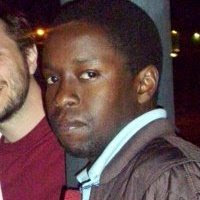There was something about Michael Quintanilla that drove expectations sky-high long before he owned the stage. Flamboyant at once, and energetic to the point of mystery, Quintanilla was quick to declare how much he loved women, setting the stage for a sensational performance in which his mom was the absent hero.
Most of the journalists attending Quintanilla's session had probably heard good things about a writer who searches deep inside his personal story to find the compassion and courage necessary to write narratives, but it seems i had underestimated the impact his performance would have on me.
In the end, Quintanilla, brilliant and funny, was for real.
He started his journalism career, he said, at a paper where an editor told him he had no place, apparently because the aspiring reporter had gay tendencies. Quintanilla had a talent for hairdressing, his editor told him, driving the young man into uncertainty.
It is proof of Quintanilla's spirit that he would become a successful writer for the Los Angeles Times, where he covered everything from dancehalls to fashion to crime. Now with the San Antonio News-Express, his workshop, appropriately called "Confessions of a Former Disco Maniac," had been brought to Indianapolis, where he was ministering to the national convention of the Society of Professional Journalists.
Let's face it, Quintanilla acts and sounds like he still is a disco maniac, but it is in his emotional energy, and in the brightness of his personality, that every journalist can find redemption. He spoke of his mother, a woman who ultimately divorced her husband after years of silent captivity, as the force behind his success. Quintanilla recalled how, in his early days as a writer, he lied to his employers that he had a car and could drive. Meanwhile, his poor mother was doing all the hard work. "We covered the police beat together," he said.
In reality, the connection between Quintanilla's journalistic success and his mother's loyalty is rich in sentiment, but the lesson is reasonable: we can be good storytellers if we summon the compassion that keeps us alive. "Anything can be an important story," he said. "Be clever and audacious...Writing is seduction. It is a seduction that begins with listening."
Yet his most important advice came when he asked journalists to be more outgoing, to spend less time in their newsrooms, to shun their phones. "I don't see us hanging out," he said. "It is the only way to get surprises for your story."
It was not hard to see why the audience inside Grand IV, at the Indianapolis Westin, never stopped applauding when Quintanilla was done, forcing him to ask us to "relax." Quintanilla had made "a human connection," in the manner of his mantra, and in the style of his journalism. He had not faked it.
Subscribe to:
Post Comments (Atom)

Das hilft mir sehr. Habe ewig danach gesucht.
ReplyDeleteAlso visit my website Provari